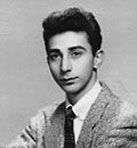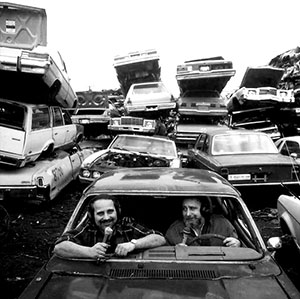 By William C. Shelton
By William C. Shelton
(The opinions and views expressed in the commentaries of The Somerville Times belong solely to the authors of those commentaries and do not reflect the views or opinions of The Somerville Times, its staff or publishers)
I once told a psychiatrist acquaintance of mine that he should stop prescribing medications for patients suffering depression. Instead, he should prescribe an hour a day of Car Talk, National Public Radio’s syndicated show wherein Tom and Ray Magliozzi dispense weekly wisdom on car repair and life.
I know that I can’t listen to Tom’s infectious and omnipresent laughter without laughing myself. By the end of a show, I’d have a dopey grin plastered on my face, and my personal troubles would seem more manageable.
Tom died November 3rd at a family home in Belmont, from Alzheimer disease complications. He had lived 77 years. My Saturday mornings will never be the same.

Tommy during his high school years.
Tom was born and grew up in East Cambridge, where his father worked in the home heating oil business. Even though his brother Ray was twelve years his Junior, when Tommy attended Cambridge High and Latin, he made Ray his frequent companion on outside-the-home adventures.
Their companionship continued while Tom attended MIT and earned a degree in chemical engineering. Upon graduation in 1958, Tom, did his six months active Army Reserve duty at Fort Dix, New Jersey, where his wisecracking kept him continually performing punishment assignments. He claimed to have peeled 6,000 potatoes during one KP shift.
His first job after active duty was at a Sylvania semiconductor facility in Norwood. Joe Nissenbaum tells me that Tom’s hiring manager emphasized that all employees must be at their desks by 8:00 AM, regardless of their positions. Still living in Cambridge, Tom seriously miscalculated the drive time to Norwood on his first day and showed up egregiously late.
His boss told him that if he wanted to work there, he would have to be punctual. Tom thought to himself, “I’m not sure that I want to work at all.” This would become a recurring theme.
From Sylvania, Tom went to work for the Foxboro Company, first managing marketing in the Far East, and then as its strategic planner where, Tom said, “I would spend my days with my feet on the desk contemplating the future.”
After twelve years there, he was driving his little MGA to work one morning when he had a close encounter with a tractor-trailer and his own mortality. When he arrived, he walked into his boss’s office and resigned. Years later he explained, “If I had bought the farm out there on Route 128, wouldn’t I be bent at all the life that I had missed?”
He took to hanging out in Harvard Square, quaffing coffee, and living spontaneously. Or, I should say, more spontaneously. Meanwhile, Ray too had gone through MIT and was teaching middle school in Vermont. Their mother, who was concerned about Tommy’s aimless lifestyle, asked Ray if he couldn’t motivate his brother to be more productive.
The result was Hacker’s Haven, a garage where do-it-yourselfers could rent tools and space for a few dollars an hour to repair their cars. In a 2001 Fresh Air interview, Tom described Hacker’s Haven customers as “complete wackos. But man were they fun. And they weren’t worried! When the guy jacked up his Lincoln Town Car and drove the floor jack through his oil pan, did he cry? He said, ‘Uh oh.’ I mean people could take a joke!

Ray and Tom broadcasting form Nissenbaums in Boynton Yards.
“What was really sort of spiritual about it was that nobody ever got hurt. I mean, in all the years that we did that, [with] complete rank amateurs using very dangerous equipment. …We didn’t know any better either! You wanna use the torch, yeah? Go ahead! We’ll be standing on the other side of the brick wall.”
It was during that period that the Magliozzis encountered two other brothers, Allen and Joe Nissenbaum, who with their father Max conducted an auto recycling operation in Boynton Yards. The Magliozzis became the Nissenbaums’ frequent customers and sometime companions. When the Nissenbaums celebrated their hundredth anniversary in the same location in 2010, Tom and Ray were on hand, purveying smiles and laughter.
Allen says that Tom’s dress code was not that different from a street person’s. One day Allen asked Tom if he knew he was wearing one white sneaker and one black sneaker. Tommy responded, “They’re great, aren’t they? I’ve got another pair just like them at home.”
After several years of making a scant profit at Hacker’s Haven, the bothers founded Good News Garage. Ray was the business’s driving force; Tom, its free spirit.
In 1977 they got a call from a WBUR producer asking them if they would participate with five other mechanics in a panel show on the following Saturday. Ray took a pass. Tom showed up and discovered that he was the only mechanic who had. After a few minutes of on-air discussion, he suggested that they take calls. The queue stacked up with avid listeners who wanted advice about their auto problems.
After the show, the producer asked Tom to return the following Saturday. Tom asked if he could bring his brother. The next week, Tommy and Ray learned that the producer had been fired, and they had the show to themselves. Thus began 37 years of Klik and Klak,, the Tappet Brothers, dispensing good humor and car advice.
They were both engineers, but they could explain how cars worked using tortured and hilarious analogies that were understandable to anyone. They applied similar analogies to life lessons
One day a lady who was buying a set of used radial tires asked Allen Nissenbaum if he knew which side of the car each tire had been mounted on, since “those two brother on the radio” say that they shouldn’t be switched side-to-side, only front-to-back.
Allen told her, “Those two brothers don’t know anything about cars.” Startled by a familiar laugh a few feet behind her, she turned to see a tall bearded man who, in an equally familiar voice, said “He’s right. Those brothers know absolutely nothing.”
After a few years at the garage, Tom left to pursue a less-structured work life, which eventually involved teaching at Boston University and consulting on marketing and planning. He continued shenanigans with his brother, including broadcasting Car Talk, holding court in Harvard Square, and playing the acoustic bass on the street. When passersby at Faneuil Hall put coins in Ray’s guitar case, few knew that the three musicians before them were the Tappet Brothers and their sister Lucille.
Car Talk’s fame spread among NPR personages, and Sunday Week End Edition’s host Susan Stamberg began regularly including a Car Talk segment. It became the most popular part of her weekly show, so in 1987 NPR syndicated Car Talk nationally. Eventually 700 stations broadcasted it to 4 million listeners.
So much of public radio in those years was…stuffy, even its attempts at humor. The Tappet Brothers’ human warmth and freewheeling humor changed all that. It is unlikely that shows like Wait Wait…Don’t Tell Me, the Moth Radio Hour, and This American Life would exist if Car Talk had not gone before.
Two years ago Tommy’s Alzheimer’s symptoms became severe, and he stopped participating in live broadcasts. But he didn’t stop laughing. Until this month.
Remembering Tommy, the brothers’ characteristic humor shone through Ray’s grief when he remarked, “Turns out he wasn’t kidding. …He really couldn’t remember last week’s puzzler.”












Reader Comments